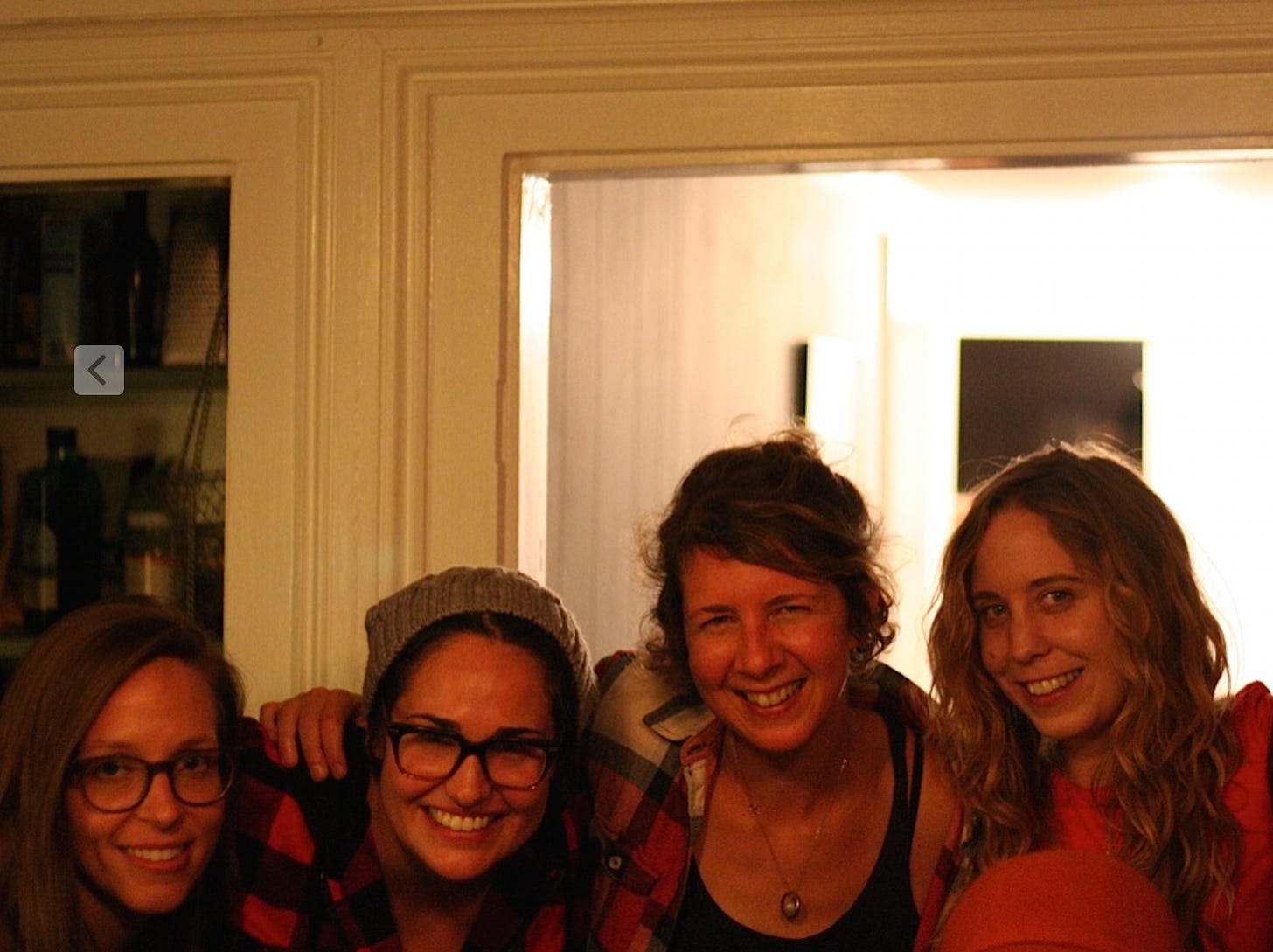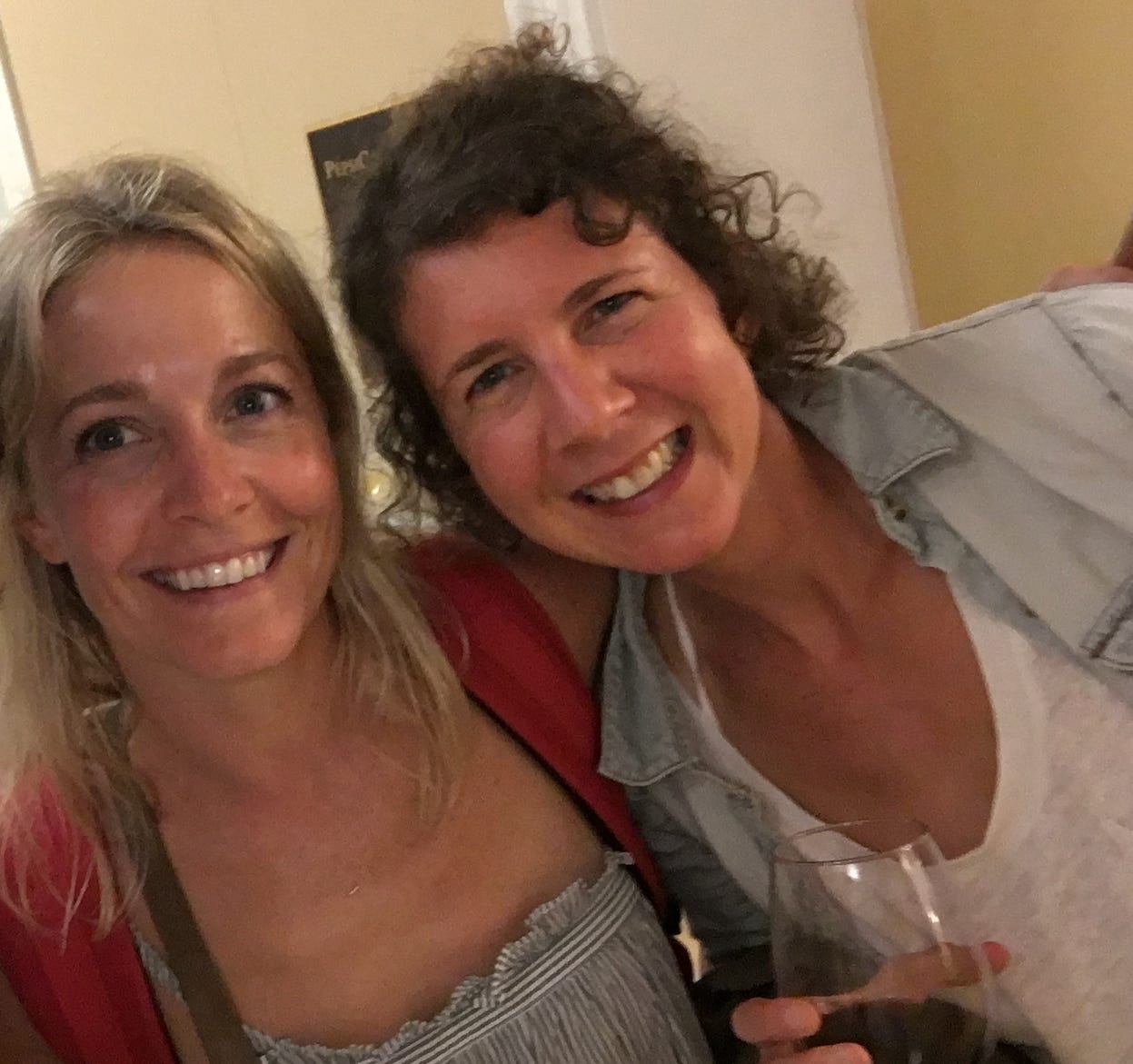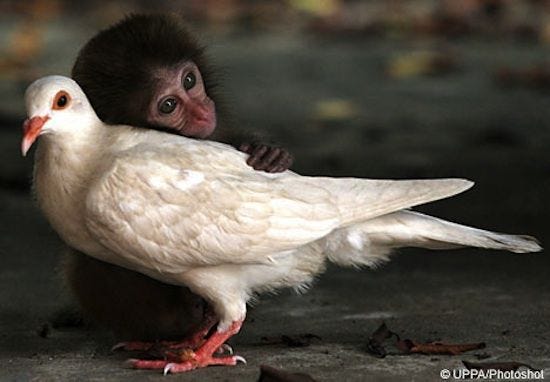The Most Valuable Part of My Writing Life
The importance of "Writer Friends" and how to cultivate them.
To continue striving to for any shred of publishing success in the present day, and certainly to write an entire book, one needs a community strong enough to establish an alternative reality. You must cultivate a world in which it is essential to keep going, a world where the possibility of “success” (however one defines it) is ever looming, and where spending all your free moments pouring over a document that may never see the light of day is completely and perfectly sane.
This requires friends—very, very good ones. Unless you are, at the core of your person, wildly self-deluded, believing anything is possible and all your decisions are perfect, having people who can boost and animate whatever hidden self-delusion lay available is critical to the writing process. To start and continue writing, you need to inhabit a reality in which you believe it is possible to do something fairly impossible. And it’s hard to create that reality without the help of other people.
The single most valuable part of my writing life, the thing that allowed me to keep going through hundreds of rejections for the past decade, are the friendships I’ve cultivated along the way. I’ve written about this before—my love for these women, how they’ve become a sort of family, how I couldn’t imagine writing (or life at this point) without them. What I want to do now is offer a few concrete tips on how to make them, and specifically as an adult who was never enrolled in an MFA or formal writing program, and also has never worked a job related to writing. In other words, my community was hobbled together from scratch.
I did not have “writer friends” until my mid-thirties, when I started to, every now and then, maybe when I’d had a few glasses of wine, admit that I was, at least in a certain sense, kind of a “writer.” (By that point I was writing constantly, but still too afraid to claim the identity.) At first these friends seemed unlike anything I’d ever had, a separate species—actual writers.
The term “writer friends” is silly. Of course they are also my friend friends, some of my closest at this point. But they’ve played a very specific (and monumental) role in my life, a role very pointedly related to writing. I’ll note that not all of these friends have to be writers themselves. Some of the most supportive people can simply be smart, generous reader friends who care deeply about your mental health.
People often claim that making friends as an adult is hard, and compared to college or high school or any time when you’re corralled with a herd of people your own age, an age at which you are inwardly dying of insecurity and desperate to find a tribe, it certainly is. But it’s also not that hard if you’re willing to (1) put in the effort and (2) genuinely put yourself out there.
I’m no guru, but friends have more or less been the cornerstone of my adult life. Here are a few tips that have helped me make, grow, and sustain writer friends, some of which can, of course, can be applied to all kinds of friends.
#1: Take classes and workshops
Almost every WF I have is either from a workshop, class, or conference I’ve attended, OR the friend of a friend who I met in a workshop / class / conference. If you think you’re too old or too young or too advanced or not advanced enough for these workshops, I urge you to reconsider. You just have to find the right one.
Most of the classes I took were with Catapult, which very sadly no longer offers classes. BUT when I searched to triple-check this depressing fact, I found that Writing Workshops now offers classes with former Catapult instructors! I’ve also heard Gotham is good, though I haven’t taken their classes yet. Writing Co-lab is also a new cooperative of writing teachers with a handful of classes.
Another avenue is conferences. I met one of my dearest WFs at VQR’s annual conference, which is also sadly defunct (!?!) but there are loads more where that came from. Tin House is notoriously great—don’t sleep on the winter workshop, which gets less attention but is super intimate and cozy. Conferences / retreats can be pricey, but some offer scholarships and if you have the money, I’ve found they’re usually worth it. Most include onsite lodging so it’s kind of like a mini sleep away camp, perfect for adolescent-grade bonding (but with your own room).
More and more, many writers are organizing and hosting their own workshops. If there’s a writer you love, poke around to see if they’re teaching. Most likely, you’ll get along with the people in their class, who likely also love that writer. I was obsessed with most of the writers I took classes from and quickly bonded with other fans in the group. For example, I’ve taken about a dozen workshops with Chloe Caldwell, who still teaches regularly through her new org, Scrappy Literary, which I can’t recommend enough.
Don’t be afraid to give a class a try. The first class I took was a one-time, three-hour session because I was terrified to sign up for anything that met more than once, lest I be forced to read my work and embarrass myself beyond repair. That one class changed my life.

#2: Find your people
With writing, it’s usually easy to know who you’ll connect with in the class because you’ll immediately connect with their writing. It’s actually wild (or maybe totally obvious?) how this is almost always the case. Find the person in the workshop whose work you love (be sure to tell them you love their work, btw; there is never enough praise for a writer), chances are they love your work, too, and you’ll be fast friends.
In addition to finding someone you connect with, look for people with similar levels of commitment / neediness, and at similar stages in their writing ~journey~ . It’s helpful to find people who are running into the same head-against-the-wall challenges as you are so you can navigate them together. Also, if someone is already exchanging work with half a dozen writer friends, they might not be very available.
Nonfiction classes, in particular, are inherently outstanding for finding your people because you’re all pouring your soul onto every page. This results in the “workshops” being real, intimate discussions about life and feelings and drama (the tears I’ve shed in nonfiction classes!) and not just the “craft” of it all (though of course, there’s that, too!), which, alone, can be intolerably stuffy and pretentious. In general, let yourself get personal, open up about the source of your writing as much as you’re comfortable, there’s no need to pretend it’s all “fiction.” That’s how the real bonds cement.
The pretentious vibe is definitely not uncommon in wiring circles, but don’t let it stop you—I’ve found most people (at least in these non-MFA classes) are kind and generous and figuring it out as they go like all of us.
#3: Offer your energy
Writers need help, whoever they are. Specifically, we need readers—always. Offer to read people’s work and mean it. Ask what kind of feedback they want. Sometimes, you just need to send a somewhat-finished draft to someone so they can read it and say “This is great, keep going!!” Other times, you want an eagle eye to look over the flawless-as-far-as-you-can-tell draft you’ve spent months on before you pitch it to The Cut. Maybe, you need help shaping an idea, understanding “the point” of a too-long essay you’ve been staring at for so long you’ve forgotten why you started and need someone to remind you what it’s actually about. Figure out what they need and help!
In addition to giving help—ask for help! As with romantic relationships (as I’ve learned the hard way), someone can’t show up for you if you don’t tell them what you need. But if and when you ask for something, be reasonable with your expectations (asking a new friend to read your *entire* novel is not reasonable lol) and always offer to swap work. If they don’t have anything to share in return at the moment, that’s fine, but don’t let them forget about it, and be available when they ask.
I’ve found that friendships are most likely to flourish when there is an even level of need and exchange. Most of the writer friends I have, I met when we were all getting started, almost none of us had published much, and we were all striving, working hard, and eager to give and receive support. The skills you offer can look very different—maybe someone is a brilliant editor, or knows how to map out a novel, or is a wizard at pitching, or is just really good at listening and being emotionally supportive—whatever it is, make sure that, over time, you’re giving at equal-ish levels.
Does this sound transactional? Shrug-emoji. I think that’s OK. The people with whom I regularly exchange work are people I love to death and want to support. I want to help them with their work and I want their feedback on my own. And I never ever want that to feel one-sided.

#4 Check in
This one applies to friendships of all kinds. Put your pride, shame, whatever is holding you back from the double text or the random call, in a trunk, lock it up, and throw it in the river. Adult friendships have little space for reserve in this way. We are all busy, our lives are much richer than they were twenty years ago, and our memories much thinner. We need reminders! We need continued outreach!
Haven’t heard from someone in a while? Check in. Maybe you were the last one to reach out—who cares? Putting yourself out there is the only way to cement friendships as an adult and (IMO) the single biggest thing that gets in most people’s way. Of course, be patient and also know when to take a hint—don’t text someone weekly if they’re constantly turning you down—but don’t be ashamed if you happen to be the one more frequently making the effort.
The thing here, at least for me, is to not taking anything too personally. People are busy. People have varying priorities. If someone doesn’t have the same level of time to offer as you do, you can certainly decide that it’s no longer a relationship you want to put effort into, but don’t make them a villain, or assume they hate you and / or your writing. We’re all just trying to get by, carving out space when we can, and mostly left with far too little of it. It’s rarely personal.
Some find it helpful to have a regular date in the calendar—dinner once a quarter, a weekend trip once a year. I’ve found this a little too strict and hard to adhere to, making something joyful turn into something stressful, but I loosely keep goals like this in mind and reach out accordingly.
#5 Embrace the highs and lows
The life of a writer is like living in a dark cave. You’re mostly fine in that cave, you keep yourself busy at least, toiling away at a task endless and all-consuming enough to forget about the fact that you live in a cave, but it’s very dark. Then, every now and then, a tiny crack appears and a small sliver of light shines through. And when that sliver comes, it’s essential to have other cave-dwellers to rejoice with.
We have to celebrate our wins, no matter how small they might seem. Your writer friends are the only ones who will really understand the import of these tiny cracks of light. There is nothing better than sharing news with a writer friend that would mean absolutely nothing to 99.9% of the population, but then your friend’s eyes widen, they shout STFU!!!!, and you feel like a little baby in a warm blanket, held and supported, and deeply understood.
The lows are just as important. Don’t be ashamed of them. Any writer will relate instantly. The other night a man introduced himself to me as a “failed writer.” Maybe he wanted sympathy but it almost felt like an affront—aren’t we all??? Failure is part and parcel to writing. The rejections are endless. Talk about them, there is no one who will understand more than your writer friends.
#5a: Make the small big: Live in the drama
A little addendum here that, again, can be applied to all friends. I will likely write a entire newsletter about this but I am a die-hard proponent of living in the drama. At first, I didn’t have a handle on this trait, which led me to subconsciously make decisions that filled my life with very real, sometimes debilitating drama (mostly via unavailable men and cross-country moves) that surely exhausted my friends. Now, my situation (and mental health) is fairly stable (knock-on-wood), and I’ve learned to create my own fabricated and—crucially—controlled drama.
For example: Was there a “significant” deal in a Publisher’s Marketplace announcement? Tell me everything. Did you hear so-and-so mention her PARTNER on the podcast—commence investigation. My favorite writer re-posted my IG story? News of the century. It’s all in our heads and nothing actually matters but it’s a blast to play with the idea that it does—to take the smallest details with the utmost seriousness. Exaggerate, gossip, live the hyperbole, it’s fun…and builds friendships!
Like most relationships, writing friendships come down to genuinely supporting the people you love. Putting yourself out there in order to find those people, then putting in concerted and regular effort to make sure that relationship is giving, on both sides, in order to basque in the camaraderie of real, mutual partnership.
I’d love to hear other strategies for building and sustaining friendships in the comments! And infinite love to my dear friends (and readers of this newsletter!) without whom writing would never be possible.
A note + reading rec
I have little to say about the dire state of our country and the world that isn’t already being said, but I want to recommend my brilliant friend Serene Khader’s new book, Faux Feminism: Why We Fall for White Feminism and How We Can Stop. In it, she expertly explains the traps of the feminist movement we find ourselves in today, how we got here, and what we can do about it. Smart, funny, and deeply insightfully—I can’t recommend it enough.






Yes! Brilliant. This is a great primer for friendship in general! I let myself get fairly cozy in (mental and physical) lockdown mode during the pandemic and getting back out there - in large part to writer friends I know via Zoom - is a bright spot in both the writing and life endeavors. Thank you for these fantastic reminders.
So beautifully put as always, Emily! Appreciate the practical tips and your helping to make writing (and making adult friends... so intimidating) feel approachable.
And a HUGE THANK YOU for starting your writing class - it's been the one and only Zoom group meeting I actually look forward to! Cannot recommend enough. If you're reading this and looking for a place to get started... get yourself signed up for Emily's next class offering!!! It's like wading into a warm & welcoming pool of people wondering if and how and when to call themselves writers with a soothing yet enthusiastic lifeguard (Emily :-D)